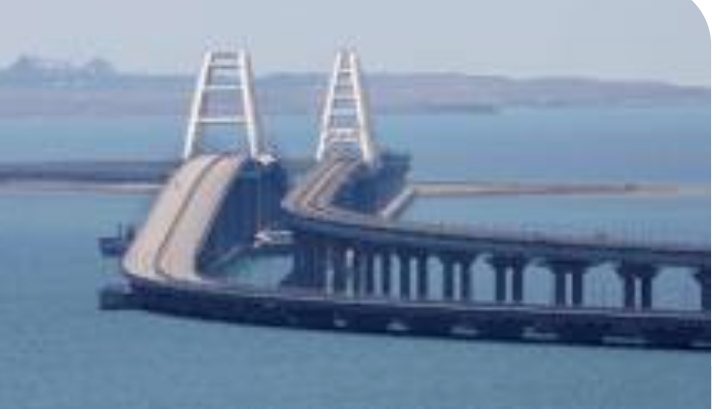Ukraine strikes Kerch Bridge with underwater blast, intensifying pressure on Russia amid stalled peace talks and upcoming NATO summit.
Ukraine Hits Bridge Linking Crimea to Russia with Underwater Explosives


Ukraine has detonated a powerful underwater explosive targeting the strategic road and rail bridge that links the Russian-occupied Crimean peninsula to mainland Russia. The attack, which damaged the bridge’s underwater supports, was claimed by Kyiv’s Security Service of Ukraine (SBU).
This marks the second high-profile Ukrainian strike on major Russian assets in recent days. Just prior, Ukraine had carried out a sophisticated drone raid on Russia’s strategic bomber fleet in Moscow.
The strike coincided with confirmation that Ukraine has been invited to attend the NATO summit later this month. President Volodymyr Zelenskyy had earlier warned that excluding Ukraine would signal a “victory” for Russia.
The 12-mile-long Kerch Bridge, a symbol of Russian control and a prestigious project personally opened by President Vladimir Putin in 2018, has now been targeted for the third time since Moscow’s full-scale invasion began in 2022. Ukrainian forces appear increasingly determined to shift the narrative that Kyiv holds limited leverage in the conflict — a view reportedly encouraged by the Trump administration.
The mining of the bridge follows Ukraine’s audacious long-range drone attacks on airbases deep within Russia. President Zelenskyy claimed those strikes had damaged 34% of Russia’s strategic cruise missile carriers.
In a further development, Russia’s state investigative committee accused Ukraine on Tuesday of carrying out “acts of terrorism” by blowing up two railway bridges in Russia over the weekend. The attacks reportedly caused two train crashes, resulting in the deaths of seven people and injuries to 113 others, including children.
According to the SBU, the Kerch bridge operation had been in planning for several months and involved the use of explosives equivalent to over a metric tonne of TNT. The security agency said the blast “severely damaged” the foundations of the bridge supports.
This is the third Ukrainian operation against the bridge. In October 2022, a truck explosion caused major damage, and in July 2023, the SBU claimed it had used an experimental naval drone to target the structure. Russia subsequently repaired both damaged sections.
Lieutenant General Vasyl Maliuk of the SBU, who oversaw the latest mission, described the Kerch bridge as “an absolutely legitimate target, especially considering that the enemy used it as a logistical artery to supply its troops.” He added, “Crimea is Ukraine, and any manifestations of occupation will receive our tough response.”
The SBU published footage showing a blast emerging from the water and debris scattering, along with an image of structural damage to the side of the bridge.
Russian authorities reported on Telegram that road traffic on the bridge had been temporarily suspended. State media noted it had remained closed for about four hours.
The bridge attack occurred as Russia acknowledged on Tuesday that expectations for a swift breakthrough in peace talks with Ukraine were unrealistic. This followed Moscow’s rejection of Kyiv’s proposal for an unconditional ceasefire during negotiations in Istanbul. The war, now in its third year, has claimed tens of thousands of lives and displaced millions from eastern Ukraine.
Instead of agreeing to Kyiv’s proposal, Russia offered a partial ceasefire lasting two to three days in select frontline areas, according to its chief negotiator. Kremlin spokesperson Dmitry Peskov told reporters, “The settlement issue is extremely complex and involves a large number of nuances. It would be wrong to expect immediate solutions and breakthroughs.”
Despite the deadlock, both sides agreed to a major prisoner swap and exchanged proposed peace roadmaps — referred to as “memorandums” — during the nearly two-hour discussions on Monday. A document published by Russian state media revealed Moscow’s demand that Ukraine withdraw its troops from four eastern and southern regions that Russia claims to have annexed, as a condition for halting its offensive.
Peskov spoke as Ukrainian presidential chief of staff Andriy Yermak and Deputy Prime Minister Yulia Svrydenko arrived in the United States to lobby for stronger sanctions against Russia. “We plan to talk about defence support and the situation on the battlefield, strengthening sanctions against Russia,” Yermak said via Telegram.
Peskov also dismissed the possibility of a summit involving the presidents of Russia, Ukraine, and the United States in the near future. “In the near future, it is unlikely,” he told reporters, emphasizing that such a meeting could only take place after Russian and Ukrainian negotiators reached an agreement.
The White House had earlier stated that U.S. President Donald Trump was “open” to such a summit — a proposal also supported by Zelenskyy and Turkish President Recep Tayyip Erdoğan.
Zelenskyy welcomed confirmation of his invitation to the NATO summit in The Hague from 24 to 26 June. His attendance follows reports of tensions with members of the Trump administration. “We were invited to the NATO summit. I think this is important,” Zelenskyy said after meeting NATO Secretary General Mark Rutte in Vilnius.

 বাংলা
বাংলা  Spanish
Spanish  Arabic
Arabic  French
French  Chinese
Chinese 
